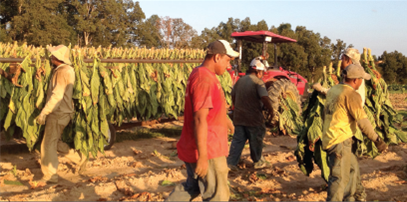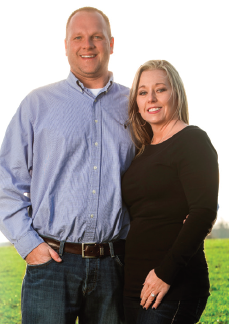Tomorrow's Top Producer Winner Joanna Carraway

A young Kentucky farmer thrives amidst adversity
Joanna Carraway is goal-oriented. Not a bucket-list, dreams-of-the-day type of goal setter; Carraway sets goals she will accomplish.
Carraway has lifetime goals, yearly goals and short-term goals. "Joanna will even set daily goals," says her husband, Craig. "It drives me crazy."
Carraway was combining a corn field on their western Kentucky farm not long ago. They moved fields late enough they should have parked the equipment and went home. "I was determined to finish it," she says. Her father-in-law, Steve, calls her at 10:30 p.m. and says, "So, I guess you’re going to finish this field?" She says: "Yep, you all go home."
A few hours later, that field was checked off her list, and she went home. Goal accomplished. "That is just the way my brain is wired," says the 35-year-old farmer. Carraway’s driven personality and analytical nature is what has helped her family’s Murray, Ky., crop operation thrive during adverse conditions.
Every corner of farm country has its own unique challenges. For the Carraways, the biggest challenge has been no rain. In 2006, the couple bought into his family’s farm, which includes a partnership with Craig’s parents, Steve and Freda.
They had a banner year growing white and yellow corn, soybeans, winter wheat and tobacco. It was so encouraging that Carraway left her job at a software development company to join the farm full-time. Craig had left his ag retail sales job in 2003.
In 2007, it quit raining, and has hardly rained since. Corn yields on Carraway Family Farms have come in under 100 bu. per acre five of the last seven years due to drought. In 2012, corn only made 31 bu. per acre.
Carraway says nothing teaches you to manage money better than not having any. In 2007 they were facing a trying financial situation. Carraway knew it was time to nitpick their financials and business plans and make some management changes.
 |
For the past decade nearly the exact same group of men has been working for the Carraways. |
Craig’s family had always bought crop insurance, but hadn’t had a crop insurance claim for years, Carraway says. "Then we came back to the farm and it quit raining."
Necessary Changes. Due to consecutive years of low yields, Carraway knew she had to ramp up her understanding of crop insurance. "It took me a week, but I studied everything I could find about crop insurance," she says. "I set up a spreadsheet that I could plug in the bushels we would potentially make, with a price, so I knew exactly what the crop insurance would pay."
Jody Jones, a River Valley Ag Credit loan officer, handles the Carraway’s crop insurance. "I had seen Joanna work hard in the field, but little did I know how smart she was when it came to the business side of agriculture," he notes. Jones says Joanna will often tell the crop insurance adjusters and him the crop insurance claim amount before it is even worked.
Her knowledge of crop insurance has proved to be financially valuable. Twice, their crop insurance checks were significantly less than what she had determined. By having her spreadsheet to show as proof, they were able to have the claims corrected.
Having a good team of advisers and partners, such as Jones, has been vital to the Carraways operation.
After a tough 2007, they decided to add more tobacco acres because it was the highest value crop on their farm. To do so, they needed to set up irrigation and build additional tobacco barns, which had a hefty price tag.
"The bank we were with at the time told us we couldn’t add any more debt," Carraway says. "I showed them on paper how the expansion was going to add a huge amount to our farm income and be the safety net we needed, but they still said no. So I went bank shopping."
With a little extra effort they were able to find a bank willing to take a chance. "We were really fortunate to find Heritage Bank," Carraway says. "They believed we had a good plan and were a good idea; while on paper, we did not look like a good idea."
Jimmy Hicks, Heritage Bank market president, has worked with the Carraways since 2008. "During this time, they have demonstrated excellent character and communication, and maintained a spotless credit rating," Hicks says, noting that their substantial financial growth is a tribute to their production and financial management skills.
Carraway is quick to credit Hicks and the bank. "He allows us the flexibility to run our business and looks at the big picture," she says. "Plus, he doesn’t point out our mistakes."
Carraway’s main responsibilities on the farm include record keeping, setting financial goals and analyzing new purchases or expansions.
Her goal is to "recycle" money. "When we spend money, I always want it to stay in the same balance sheet," Carraway says. "I don’t want to spend money that won’t be positively reflected on the balance sheet."
A recent example is the purchase of a larger spray coupe. "Joanna did the math and determined it was a better investment to buy a bigger sprayer instead of hiring guys from the local coop to help spray," Craig says. "That has been a great investment."
Machinery costs are an area the Carraways focus on. "We can’t afford to have broken-down machinery for very long," Carraway says, explaining that they buy extended warranties, typically three years, on key equipment. Even on new machinery, a small problem can quickly surpass the cost of the warranty. "We know for the three years we’re going to have this machine what it will cost us," she says. "There are no surprises, which means we can run at full efficiency."
Relationship Management. For more than a decade, 12 men from Mexico traveled north to spend six months on the Carraway Family Farm. The Carraways pay for H-2A visas, which allow temporary agricultural workers to seek employment in the U.S. Expenses for traveling to and from Kentucky, as well as housing, transportation and wages while in Kentucky, are paid by the Carraways.
Their main responsibilities are tobacco related, Craig says, and the program is expensive, but they wouldn’t be able to produce tobacco without them. "If you’re going to raise tobacco of any magnitude, you depend on migrant workers."
What’s impressive is for the past decade nearly the exact same group of men has been working for the Carraways. "They are like family to us," Carraway says. Through Facebook, she has connected with her employees’ families and posts updates and photos of what’s going on around the farm.
Carraway understands the sacrifice their employees make. "They are here trying to make a better life for their kids," she says. "My goal is to set something up, like a retirement plan, for them. Tobacco is such hard work and they can’t do it forever. They have been so good to us, that I want to do something long-term for them. Ultimately, we need to grow and expand, but we want them to have something for later."
The Carraways also maintain landlord relationships. They rent around 2,450 acres and have 50 landlords. Craig says these relationships have always been important. His grandfather started a tradition of providing sweet corn to landlords, then his father added sausage.
Now, Carraway has taken it a step further. Each year, she mails a card that features a snapshot of the farm. They also send notepads, hats and pens with the farm logo to help solidify their relationship.
These acts of kindness can lead to opportunities. Their goal is to fine-tune their finances so if a landlord wants to sell them his or her farm, they will be in a position to buy.
At the Heart. Originally a Missouri farm girl, Carraway grew up the youngest of five girls on a row-crop farm. Her father never hired employees, so his daughters became expert truck and tractor drivers at an early age. By age 10, Carraway was working 14-hour days. "My dad never asked if we could do something, he just told us to do it," she says.
Carraway left the farm for Murray State University and majored in business administration. After six months, she missed agriculture; it was in her blood. She switched her major to agronomy and started an internship at a local ag retail store, where she met Craig.
As the daughter-in-law in a multi-generational operation, she admits it can be challenging, but with her farm family background Carraway understands the emotional connection families have with the land and their property.
Craig’s family wants the farm to succeed and stay intact, she says, and they try to balance that with her own goals and dreams for the farm. "It isn’t like I just married a farmer," Carraway says. "This was my dream before I met him. We just happened to have the same dream."
A Profile of Carraway Family Farms
 |
Joanna and Craig Carraway focus on relationships with their advisers, landlords and workers. |
Long Line of Farming: Carraway Family Farms began in 1953, when Noby Carraway bought land near Murray, Ky. He and his wife, Euva, farmed until their son, Steve and his wife, Freda, joined the operation in 1971. After Noby passed away, and in 2006 Joanna and Craig began a five-year process of purchasing Euva’s share. Joanna and Craig have two children, Preston, 7, and Hannah, 2.
Crop Mix: The Carraways own 42 acres and rent 2,450. Around 80 acres are planted in tobacco and the remaining acres are used to produce white corn, yellow corn, soybeans and double-crop winter wheat.
Employee Management: Carraway Family Farms employs 12 migrant workers each year, whose main duty is to help with tobacco production. Joanna has connected with the workers’ families through social media, which helps them stay in touch during their six months apart.
Community Focused: Joanna says she never realized she would need to be an advocate for agriculture, but as fewer people have a direct connection to farming, she recognizes the need. In 2012, Carraway Family Farms donated funds for the local elementary school to build an outdoor classroom and garden. "It’s important for children to learn how food is grown," she says. "It’s just one little garden at one little school, but it could make a difference."
....................................
Register now for the 2016 Tomorrow's Top Producer business conference happening June 16-17 in Nashville!







